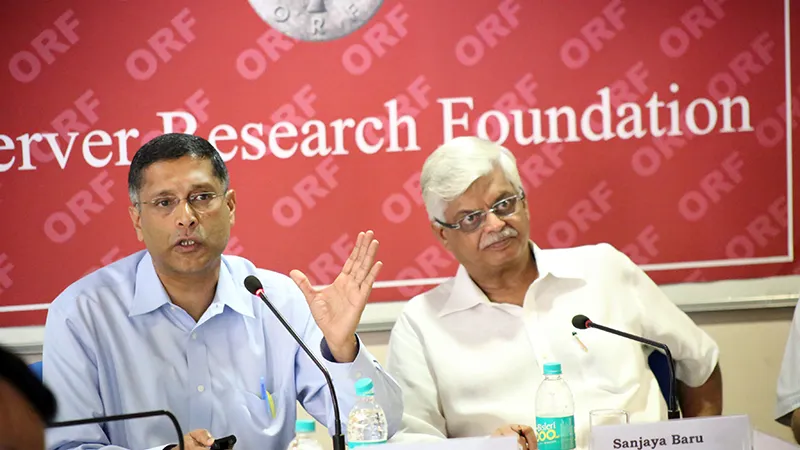-
CENTRES
Progammes & Centres
Location
Saying that the rise of China and the declining power of the US hint to a new vacuum, Dr. Arvind Subramanian argues that the US should empower the rise of China rather than contain it. By giving China the necessarily positions in existing multilateral institutions, it would force it to behave as a responsible stakeholder, he says.

The rise of China and the declining power of the US hint to a new vacuum that is being created in the international order, according to Dr. Arvind Subramanian, Dennis Weatherstone Senior Fellow, Peterson Institute for International Economics (PIIE) & Senior Fellow, Centre for Global Development.
Giving a presentation on "US-China Strategic Economic Blueprint: Implications for India" at Observer Research Foundation in Delhi on June 21, 2013, Dr. Subramanian said the US is becoming increasingly unable, both financially and economically, whereas China on the other hand is both unable and unwilling to supply the gap created by the deficiency of the US.
Dr. Subramanian started with what he called the Kindleberger Conundrum, where a situation in which the existing power is unable to sustain the international system and the new aspiring power was unwilling to take up the mantle, in a clear reference to the power equation between US and China. This comment was a preface to a larger question, how does one maintain status quo of the global economic system? He said "today we have a kind of a vacuum, a G-zero…and like nature, foreign policy abhors a vacuum, resulting in the chaos of the inter-war years - protectionism, economic depression etc. Today we have a comparable situation….the global economic system, at least to some extent, has relied upon the US as an economic hegemon, willing to supply the public good of cooperation."
He preferred to call China a ’precautious’ superpower - history has shown that all powers have been originally rich before becoming a power, whereas China is relatively poor or not-so-rich superpower.
Dr. Subramanian proposed what he called a Power-for-Purpose bargain i.e. "the US should be willing to give up power to China in existing multilateral institutions and in return this would create a stake for China in the system and therefore it will a greater incentive and ability to further the purpose for which the system was created, which is to maintain a multilateral open system, open-trading system, open financial system, non-discriminatory, liberal."
Dr. Subramanian attempted to explicate whether the fuss about China’s rise is actually worth the worry or is it overstated? He felt that the shift in economic dominance from the US to China may well be overstated. According to him, the US still retains considerable power and influence in the various multilateral institutions. There continues to be a lot of cooperation between the two powers notwithstanding the issues of tension.
He argued that the US should empower the rise of China rather than contain it. By giving China the necessarily positions in existing multilateral institutions, it would force it to behave as a responsible stakeholder, he said. According to him multilateralism provides collective heft on the other side to negotiate/bargain with China, something that the US can no longer do alone. Multilateralism also defined what is legitimate and even China will be sensitive to being seen as deviant from multilateral norms. Empowering China would increase its stake in the open system that China continues to need for its own development, Dr. Subramanian argued.
The discussion moved to understanding how the Indian elite have had difficulty in thinking international relations in structural terms.
Chairing the event, Dr. Sanjaya Baru, Director for Geo-Economics and Strategy, International Institute for Strategic Studies, said he along with Dr. C. Raja Mohan, when they were members of the National Security Advisory Board, had tried to impress on other members that the key to power in the 21st century lies in the economic capability of nations, but they were reluctant to agree to this argument.
Dr. C Raja Mohan, Head of ORF Strategic Programme, said there are power shifts, contestations and confrontations and that great powers will shape the future of the international system. He said India, since independence, by emphasizing non-alignment, have figured out a way to withdraw from these contestations, but not a way to influence them. When a large part of the economy is linked to the international system, maintaining strategic autonomy becomes difficult, he said.
(This report is prepared by Rohit Sinha, Research Assistant, Observer Research Foundation, Delhi)
The views expressed above belong to the author(s). ORF research and analyses now available on Telegram! Click here to access our curated content — blogs, longforms and interviews.